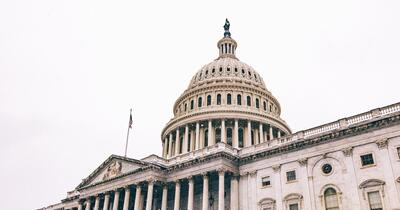
Lessons for an Equitable Recovery: What Policymakers Can Learn from the Great Recession and Hurricane Katrina
Congress and the Biden administration must take a different route as they seek a more equitable recovery from the COVID-19 crisis.

As many warned early on, the pandemic economic collapse is worsening pre-existing structural inequities of power, wealth, and well-being, especially along racial lines.
In late November, the Dow Jones hit a record high. At the same time, more than 1 in 5 Black households with children and 1 in 6 Latinx households with children reported not having enough food to eat, a dramatic increase from the year before the pandemic. The vast rift between these two indicators is the latest sign of what economists are calling “K-shaped” recovery from the pandemic, with corporate and stock market gains expanding rapidly even as many Black, brown and low-income people confront a calamitous rise in hunger, housing insecurity, and COVID-19 deaths. As many warned early on, the pandemic economic collapse is worsening pre-existing structural inequities of power, wealth, and well-being, especially along racial lines. The next steps by Congress and the incoming Biden administration can change the picture and put the nation on a more equitable path.
Immediate relief is imperative. At the same time, we must reclaim our democracy, rebuilding trust in government and its efficacy to solve the nation’s most pressing problems as we rebuild our economy. Political leaders must use this opportunity to dismantle structural inequities and deconcentrate corporate power, invest in an expanded concept of public infrastructure, and build power and participation of Black and brown communities to control decisions about the economic recovery. Efforts at economic recovery in the nation’s recent past, such as the 2008 economic crisis and the city of New Orleans’ recovery from Hurricane Katrina in 2005, offer a critical lesson: Because these efforts failed to tackle deeper disparities of power and wealth, they worsened racial inequity.
The larger economic collapse [of the Great Recession] triggered gigantic layoffs and long-term unemployment, with Black workers facing the most severe job losses.
The Great Recession of 2008 was sparked after years of financial deregulation unleashed a massive wave of reckless mortgage lending, including predatory loans that targeted Black and brown families. When housing markets crashed, millions of people, disproportionately Black and brown families, faced foreclosure, while banks and other financial firms that massively speculated on risky mortgage loans found themselves on the brink of ruin when these loans could not be paid. The larger economic collapse triggered gigantic layoffs and long-term unemployment, with Black workers facing the most severe job losses.
Policymakers passed the American Recovery and Reinvestment Act in an effort to rescue the economy. The $800 billion stimulus played a vital role in stanching the hemorrhaging economy, yet it was too small to address the scope of the economic calamity. Additional aid arrived in the form of the Troubled Asset Relief Program (TARP), a Treasury Department program to purchase up to $700 billion of mortgages from financial institutions, with the promise that mortgages would be modified to help struggling homeowners. Yet with no strings attached, little of this money actually flowed to homeowners or prevented foreclosures. Programs intended to keep families in their homes were overly complicated and restrictive, ultimately helping only a fraction of the struggling homeowners in need of assistance. While the TARP program and the trillions of dollars the Federal Reserve lent to Wall Street banks succeeded in stabilizing financial institutions and preventing a meltdown in the financial system, they failed to prevent economic devastation for ordinary Americans: employment took longer to reach pre-recession levels than in any other of the previous three recoveries. Black families lost 53 percent of their total household wealth in the housing crash and Latinx families lost 66 percent.
Meanwhile, Congress failed to impose accountability or reduce the power of the reckless lenders that caused the crash. Efforts to break up banks never achieved majority support in Congress. The nation’s largest banks are now bigger and more profitable than ever. New financial regulations and the creation of the Consumer Financial Protection Bureau helped to tame risky lending and offer critical protection to Black and brown consumers, yet even these gains have been substantially eroded by the Trump administration. Because Congress failed to structurally limit the size and power of irresponsible banks or to meaningfully shift power and control to hard-hit Black and brown communities, economic relief shored up the system, but left disparities worse, so that even the strongest reform efforts were vulnerable to retrenchment.
A similar dynamic played out in New Orleans in the aftermath of Hurricane Katrina.
A similar dynamic played out in New Orleans in the aftermath of Hurricane Katrina. Even before the storm struck, authorities worsened its impact by failing to take disparities of power and wealth into account in their planning, providing insufficient evacuation resources to vulnerable populations such as nursing home residents and people who lacked a car or money for transportation. Once the hurricane hit and the levees failed, deep historical patterns of segregation and divestment ensured that Black neighborhoods were among the most impacted by flooding, while decisions made in recovery allocated Black neighborhoods less funding in the rebuilding process. Rather than working to shift power or address racial disparities—for example, by making substantial new public investments in public systems like housing and schools that offered inadequate support to New Orleans’ Black communities before the storm—policymakers instead embraced market-oriented solutions. They divested from public goods by demolishing public housing (including buildings that were undamaged by the storm and floods) and closing public schools, beginning a shift to the nation’s first all-charter school system.
The impacts of these policy choices have been profound: Low-income, predominantly Black families were displaced by both the storm damage and the demolition of public housing, so that in 2019 there were 92,974 fewer Black people living in New Orleans compared to 2000. Real estate developers received tax breaks to build luxury, high-end apartments, gentrifying neighborhoods and fueling an affordable housing crisis. Meanwhile, the shift to charter schools led to a decline in spending on classroom instruction and a reduction in the credentials and experience of teachers. School segregation did not decrease.
In the 15 years since Hurricane Katrina, much of New Orleans has been rebuilt. Before the pandemic, tourism had rebounded and the city could be regarded as thriving. Yet in 2019, it was also one of the nation’s most unequal cities, with a particularly stark legacy of racial inequality. By failing to tackle inequities of power and wealth, policymakers produced a vastly unequal recovery.
With these elements of equitable recovery in place, the nation can build a more just economy going forward.
Drawing on these lessons from the past, Congress and the Biden administration must take a different route as they seek a more equitable recovery from the COVID-19 crisis. While political leaders failed to break up too-big-to-fail banks in the aftermath of the 2008 financial crisis, they must now act to break up concentrations of corporate power. Where leaders failed to invest sufficiently in public goods and public infrastructure after past disasters, they must make significant investments now, ensuring that resources flow to the Black and brown communities that have been most damaged by historic divestment and the current crisis. The new national equity mapping program from Demos and Evergreen Collaborative offers a compelling illustration of inequitable access to power and resources. Finally, where political leaders failed to ensure affected communities were directly empowered and had leverage over the policy decisions that deeply affect their lives and futures, they must now act to build mechanisms for co-governance and civic power. With these elements of equitable recovery in place, the nation can build a more just economy going forward.




